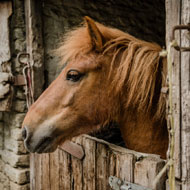Sycamore warning after pony death

Atypical myopathy has been linked to toxins found in sycamore tree seeds.
A warning has been issued of the dangers of sycamore following the death of a pony rehomed by the Blue Cross.
According to the charity, the pony tragically died from atypical myopathy (AM), which is thought to be caused by toxins from the seeds of sycamore trees.
There were no sycamore trees in or nearby the pony's field. It is thought the seeds ingested were brought in by floodwater.
Gemma Taylor, education officer at Blue Cross, said: "One of our horses in an experienced loan home unfortunately lost his battle with this fatal disease last week…
"This tragic incident has brought home how horrific this disease can be and how all horse owners have to stay alert to the dangers to try to minimise this dreadful disease."
AM is a fatal muscle disease seen in the UK and Northern Europe. Research indicates it is caused by the ingestion of hypoglycin A - a toxin contained in sycamore tree seeds.
An equivalent disease in the USA, known as seasonal pasture myopathy, has also been linked to hypoglycin A toxins from box elder trees.
According to Blue Cross, there has been an "alarming rise" in the number of new AM cases this spring. Young horses and those being grazed on parched land appear to be more vulnerable.
Symptoms include muscle weakness, depression, recumbency, dark red urine, choke or colic-type symptoms.
Blue Cross has joined forces with vets at Bourton Vale Equine Clinic to put together some top tips for owners:
- Feed forage such as hay in parched fields - off the floor in hay-nets or feed racks
- Do not over stock
- Limit turnout. Ideally stable horses over night
- Section off areas around poisonous trees and collect and dispose of leaves safely away from horses
- Remove young sapling plants
- Be careful of streams running through paddocks as this is thought to be more prevalent in moist places
- Be vigilant of the potential signs of this disease and act quickly if your horse becomes poorly
- Ensure you check your horse regularly at least twice daily
- Check your vet insurance is up to date
Image courtesy of Blue Cross



 The latest
The latest